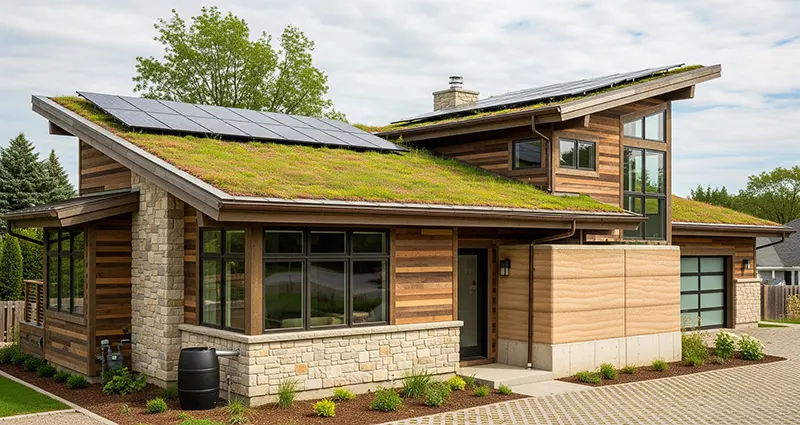As awareness of environmental issues grows, more homeowners and builders are seeking sustainable building materials for residential home construction. Sustainable materials not only reduce the environmental footprint of a home but also improve energy efficiency, indoor air quality, and long-term durability. Choosing eco-friendly building materials is an important step toward creating healthier living spaces while conserving natural resources for future generations.
What Are Sustainable Building Materials?
Sustainable building materials are products that have minimal negative impact on the environment throughout their lifecycle—from extraction and production to use and disposal. These materials often come from renewable resources, require less energy to manufacture, and can be recycled or reused. Additionally, sustainable materials support healthier indoor environments by minimizing harmful chemicals and pollutants.
Popular Sustainable Building Materials for Residential Construction
1. Bamboo
Bamboo is a rapidly renewable resource known for its strength and versatility. It grows much faster than traditional hardwoods, making it an excellent sustainable option for flooring, cabinetry, and structural elements. Bamboo’s natural durability and aesthetic appeal make it an increasingly popular choice in residential construction.
2. Recycled Steel
Steel that is recycled reduces the need for new mining operations, thus lowering environmental degradation. Recycled steel is robust, termite-resistant, and highly durable, making it ideal for framing and roofing in homes. Using recycled steel also promotes waste reduction in the construction industry.
3. Insulated Concrete Forms (ICFs)
ICFs are hollow blocks made from insulating foam that are stacked, then filled with concrete to create strong, energy-efficient walls. Homes built with ICFs have superior thermal insulation, reduced air infiltration, and excellent soundproofing. This material contributes to lower energy bills and increased occupant comfort.
4. Cork
Cork is harvested from the bark of cork oak trees without harming the tree, allowing for continual harvesting every 9-12 years. It is a renewable, biodegradable material used for flooring, wall coverings, and insulation. Cork offers natural thermal and acoustic insulation, making it a sustainable and functional choice.
5. Reclaimed Wood
Using reclaimed wood salvaged from old buildings and structures conserves forests and adds unique character to a home. Reclaimed wood can be used for flooring, beams, furniture, and accent walls, supporting both sustainability and design aesthetics.
6. Low-VOC Paints and Finishes
Volatile Organic Compounds (VOCs) found in many conventional paints contribute to indoor air pollution. Low-VOC or zero-VOC paints reduce harmful emissions, improving indoor air quality and occupant health while being environmentally friendlier.
7. Straw Bales
Straw bales are an excellent insulating building material made from agricultural byproducts. They provide high thermal resistance, are biodegradable, and have a low embodied energy compared to traditional insulation materials. Straw bale construction also promotes waste recycling from farming operations.
Benefits of Using Sustainable Materials in Residential Construction
- Energy Efficiency: Many sustainable materials provide better insulation, leading to reduced heating and cooling costs.
- Environmental Protection: Reduced resource depletion and lower greenhouse gas emissions help combat climate change.
- Improved Indoor Air Quality: Non-toxic materials minimize allergens, pollutants, and odors inside homes.
- Durability and Low Maintenance: Sustainable materials often require less upkeep and last longer.
- Increased Property Value: Eco-friendly homes are increasingly desirable in the real estate market.
Incorporating sustainable building materials into residential home construction is a win-win for both homeowners and the planet. By selecting eco-friendly options like bamboo, recycled steel, and low-VOC paints, builders can create homes that are healthier, more energy-efficient, and environmentally responsible. As technology advances and awareness grows, sustainable materials continue to revolutionize the way we build, ensuring safer and more resilient homes for future generations.
Whether you are planning a new build or renovating an existing home, prioritizing sustainable building materials is an impactful step toward a greener, more sustainable future.












